Overview
The article titled "10 Essential Autism Resource Centers for Parents" shines a light on vital organizations that offer crucial support and resources for families navigating the complexities of autism spectrum disorder (ASD). It highlights the importance of these resource centers, which provide a range of services, including:
- Diagnostic assessments
- Therapeutic interventions
- Training programs
These services are not just beneficial; they are essential for empowering parents and enhancing outcomes for children with autism.
As parents, you may often feel overwhelmed by the challenges that come with ASD. It’s important to know that you are not alone in this journey. These centers understand your struggles and are here to help. They can provide the guidance and support you need, making a significant difference in your family's experience.
Imagine having access to a community that not only understands your concerns but also offers practical solutions. The resource centers mentioned in the article are dedicated to ensuring that you have the tools and knowledge necessary to advocate for your child effectively.
We encourage you to explore these organizations and reach out for support. Your journey is unique, and finding the right resources can empower you and your child in meaningful ways. Remember, seeking help is a sign of strength, and there are people ready to walk alongside you every step of the way.
Introduction
Navigating the complexities of autism can feel overwhelming for parents, particularly when searching for the right support and resources. As the prevalence of autism spectrum disorder continues to rise, access to reliable information and specialized services has never been more important. This article shines a light on ten essential autism resource centers that provide invaluable tools, training, and support for families. These centers empower parents to advocate effectively for their children's needs.
How might these centers transform the landscape of autism care, offering hope and better outcomes for families striving for a brighter future?
About ASD Media: Comprehensive Resources for Autism Support
At ASD Media, we are deeply committed to enhancing the application of ABA therapy, offering a comprehensive range of tools and insights specifically designed for parents and professionals alike. Our mission is to foster a nurturing community where individuals can share their experiences and learn from one another, creating a space of support and understanding. By subscribing to our newsletter, families can stay informed with the latest news and access valuable resources from the autism resource center aimed at improving outcomes for children with autism and ADHD.
Research highlights the importance of early intervention through ABA therapy, with a meta-analysis of 14 randomized control trials revealing that this approach can lead to significant advancements in communication and social skills. Remarkably, 50% of young individuals show improved abilities when therapy begins before the age of four. Furthermore, studies indicate that 90% of children receiving intensive ABA therapy experience substantial progress, underscoring the therapy's effectiveness.
ASD Media serves as a crucial ally in the ABA therapy sector, where an autism resource center plays a significant role, contributing to 45% of long-term successful therapies for youth with developmental disorders. By staying informed about the latest research and strategies in ABA therapy, caregivers are better equipped to advocate for their children's needs. This is particularly vital, considering that nearly 30% of U.S. youths with developmental disorders do not receive any behavioral or medication treatment. Together, we can navigate these challenges and ensure that every child receives the support they deserve.
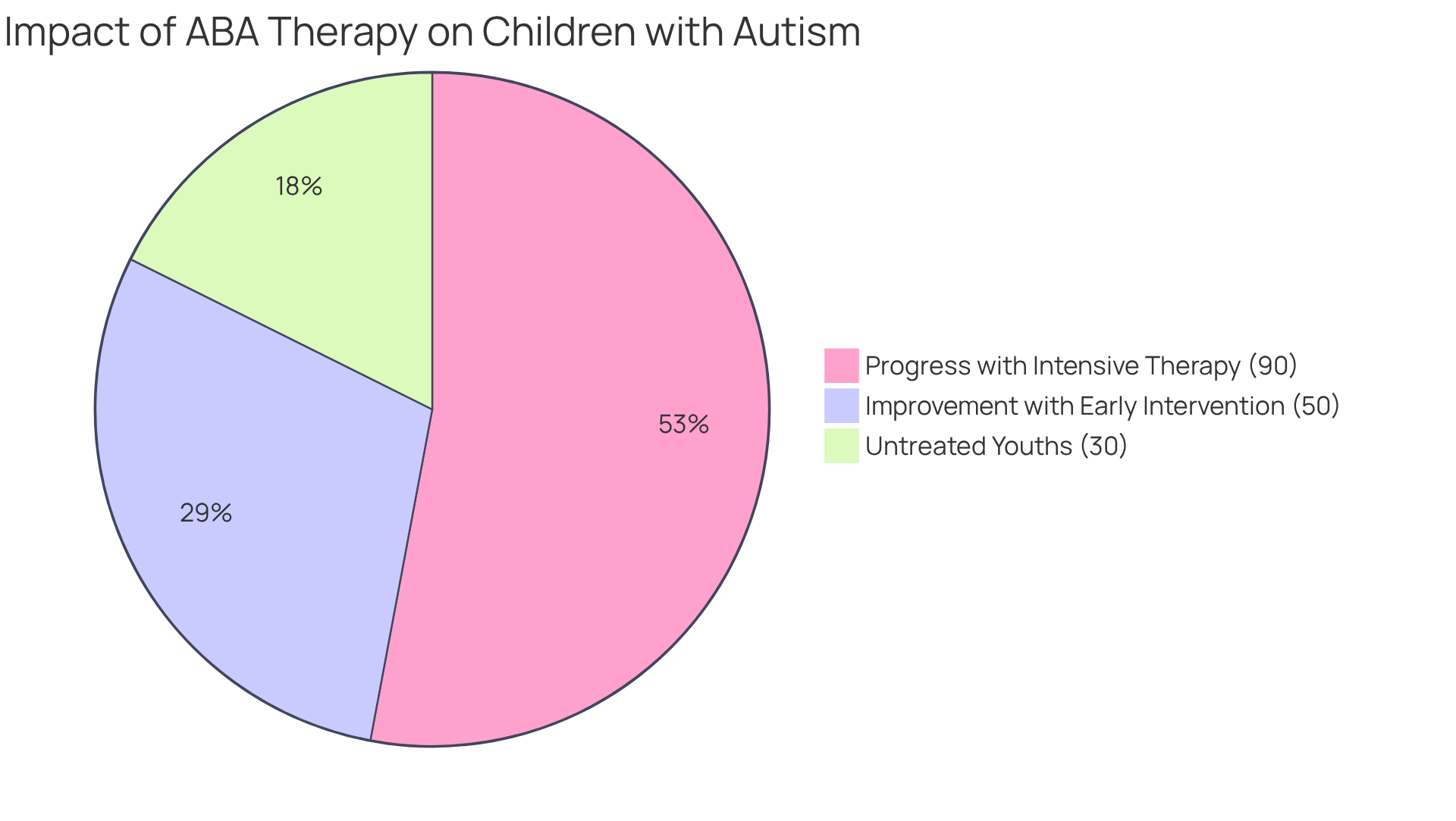
Lurie Center for Autism: Specialized Services for Children
The Lurie Center for Autism, affiliated with Massachusetts General Hospital, functions as a crucial autism resource center for families navigating the complexities of autism spectrum disorder (ASD). With a heartfelt commitment to a multidisciplinary approach, the center tailors its services to meet the unique needs of each individual. Families can access a variety of specialized services, including:
- Comprehensive diagnostic assessments
- Evidence-based therapeutic interventions
- Strong family support programs
This holistic care model not only addresses the immediate needs of young individuals but also nurtures long-term developmental success.
Families have shared inspiring stories of significant improvements in their children's communication and social skills, highlighting the effectiveness of the center's interventions. By integrating diverse specialties, such as speech therapy and behavioral analysis, the Lurie Center ensures that young individuals receive well-rounded care, paving the way for positive outcomes and empowering families on their journey with developmental differences.
As Robert F. Kennedy, Jr. poignantly stated, "One in 31 American children born in 2014 are disabled by a developmental disorder," which underscores the urgent need for effective interventions. Early diagnosis and timely access to services are crucial, especially considering that the average age of diagnosis for this condition in the U.S. is five years. The Lurie Center's mission aligns seamlessly with ASD Media's goal of empowering parents and professionals, establishing it as an essential partner in the care landscape for individuals with developmental disorders, particularly as an autism resource center.
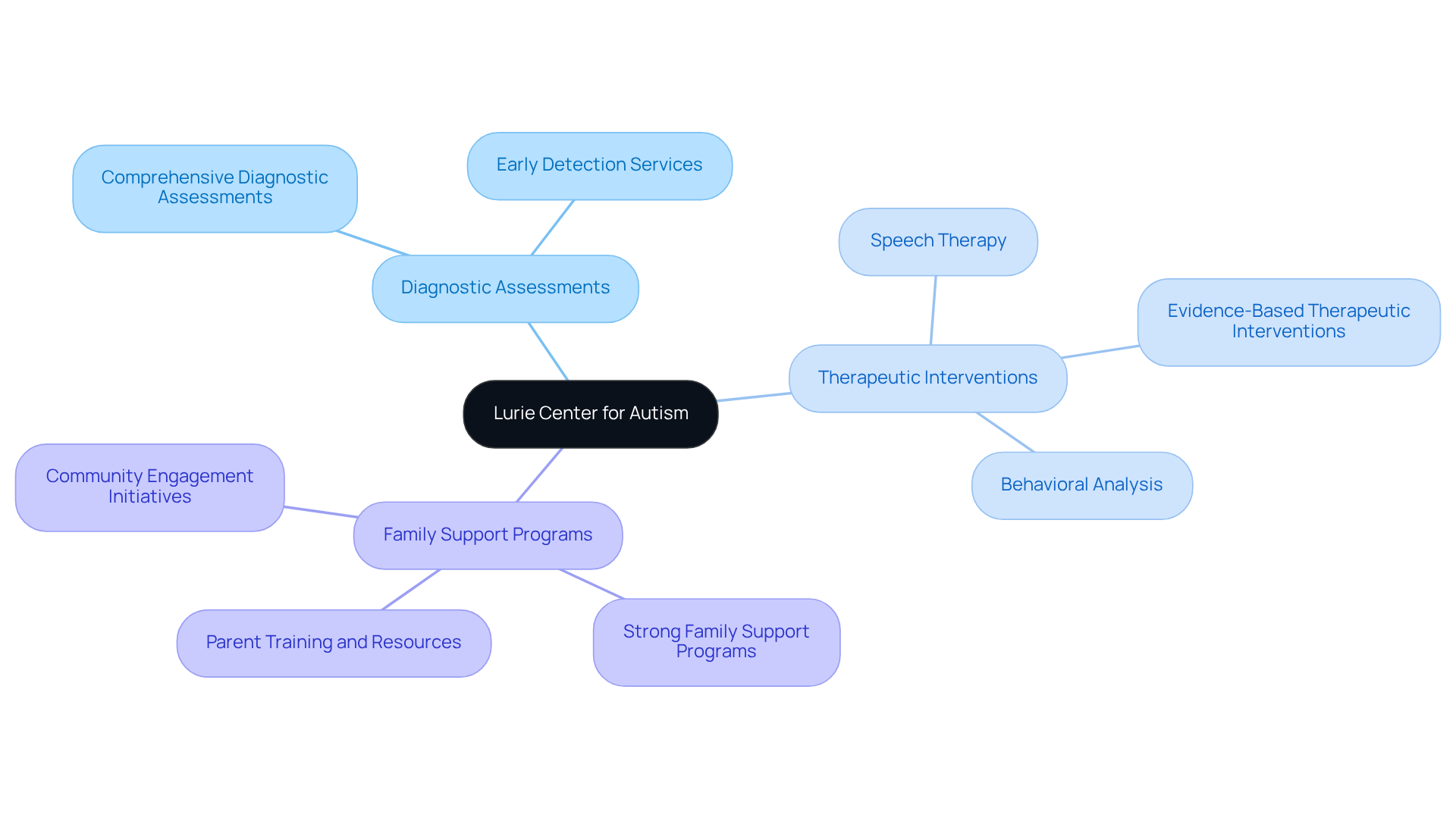
Milestones Autism Resources: Tools and Training for Effective Management
Effective training programs play a vital role in equipping families and professionals with essential resources from the autism resource center needed to manage autism successfully. These resources—such as evidence-based methods, coaching, and workshops—empower caregivers to implement personalized strategies for autistic individuals. By fostering skill enhancement and confidence among caregivers, these programs significantly contribute to improved outcomes in developmental disorder care.
Research shows that training initiatives can result in a remarkable 63% increase in positive outcomes for autistic individuals. This statistic highlights the critical importance of effective management tools in this field. As Temple Grandin insightfully states, 'I am different, not less.' This powerful reminder underscores the necessity of understanding and support, which are essential in recognizing the unique strengths of each individual on the spectrum.
We encourage you to explore the training resources available at the autism resource center and share your experiences, as together we can create a more supportive environment for those we care about.
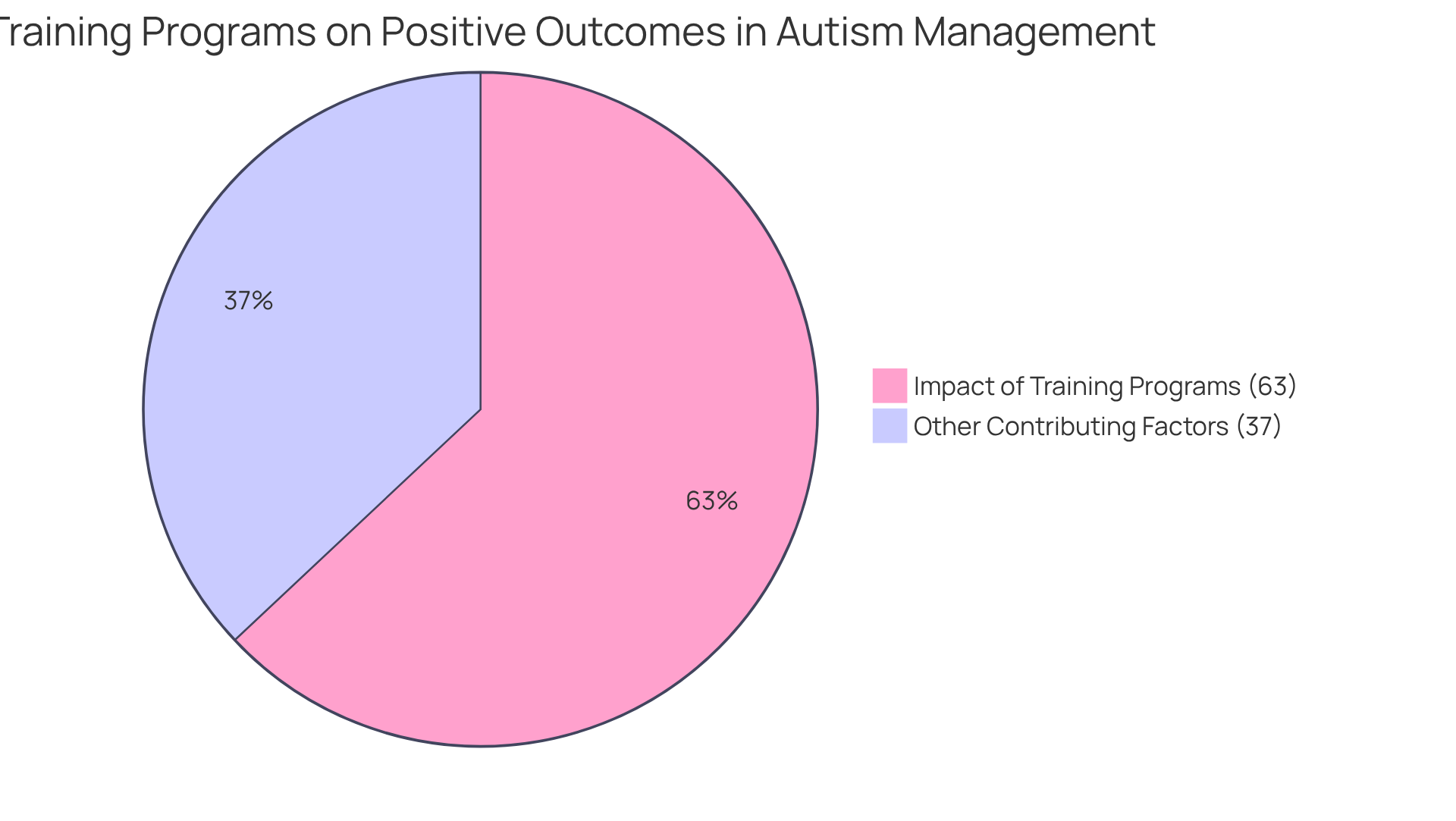
New Brunswick Autism Resource Hub: Essential Information for Parents
The New Brunswick autism resource center serves as a vital resource for parents seeking essential information about autism-related services in their community. This center serves as an autism resource center that unites materials, support services, and educational tools, making it easier for families to navigate the challenges of autism care. By providing localized information, the hub empowers parents to make informed decisions regarding their child's support. One parent shared, "The materials supplied by the hub have been a game-changer for us," reflecting the high satisfaction with the hub's offerings and its effectiveness in meeting diverse family needs.
As the prevalence of developmental disorders continues to rise, with the latest 2025 CDC report indicating that one in 31 young individuals are affected, the importance of the autism resource center cannot be overstated. They play a crucial role in fostering knowledgeable and empowered parenting, especially as families seek early intervention services and educational support in light of the increasing occurrence of developmental disorders. Together, we can create a nurturing environment that supports our children and helps them thrive.
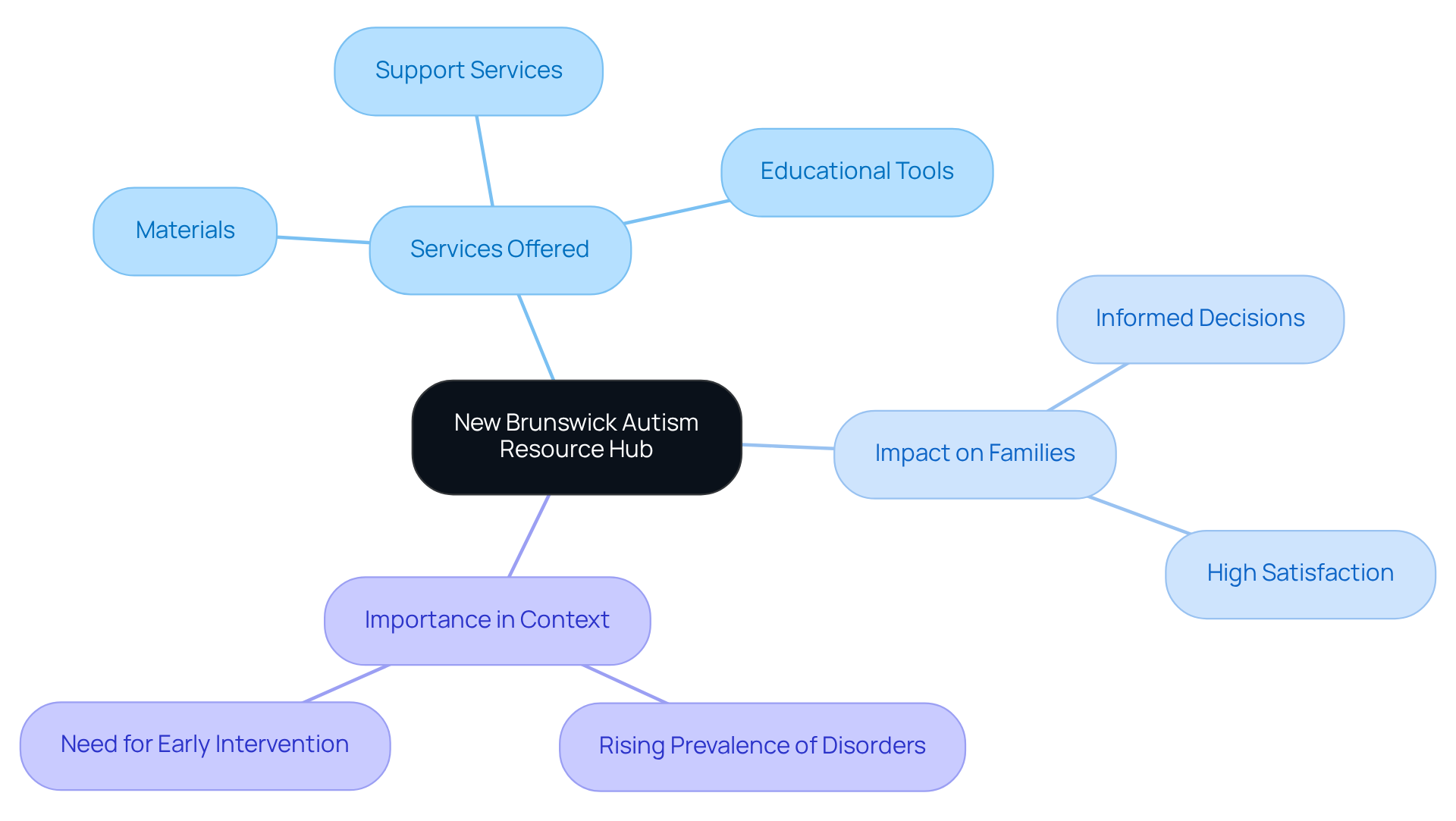
Seattle Children's Autism Center: Specialized Care and Resources
At the autism resource center of Seattle Children's, we understand the unique challenges faced by families of youth with developmental disorders. Our commitment is to provide tailored support and resources at the autism resource center that truly make a difference. We provide a comprehensive range of services at our autism resource center, including:
- Diagnostic assessments
- Therapeutic treatments
- Robust support programs for families
By prioritizing family-oriented care at the autism resource center, we ensure that parents are actively engaged in their child's treatment, fostering a collaborative approach to support. Specialists in the field emphasize that involving family members in the therapeutic process is crucial for achieving positive outcomes, ensuring that children receive the thorough care they need.
With approximately 1 in 44 children diagnosed each year, the importance of these services cannot be overstated. As Temple Grandin, a prominent advocate for neurodiversity, poignantly states, 'I am unique, not lesser.' This highlights the vital role of family involvement in therapy. By focusing on family engagement, Seattle Children's Center for Neurodevelopmental Disorders not only empowers families but also aligns with the growing recognition that effective treatment hinges on the active participation of loved ones.
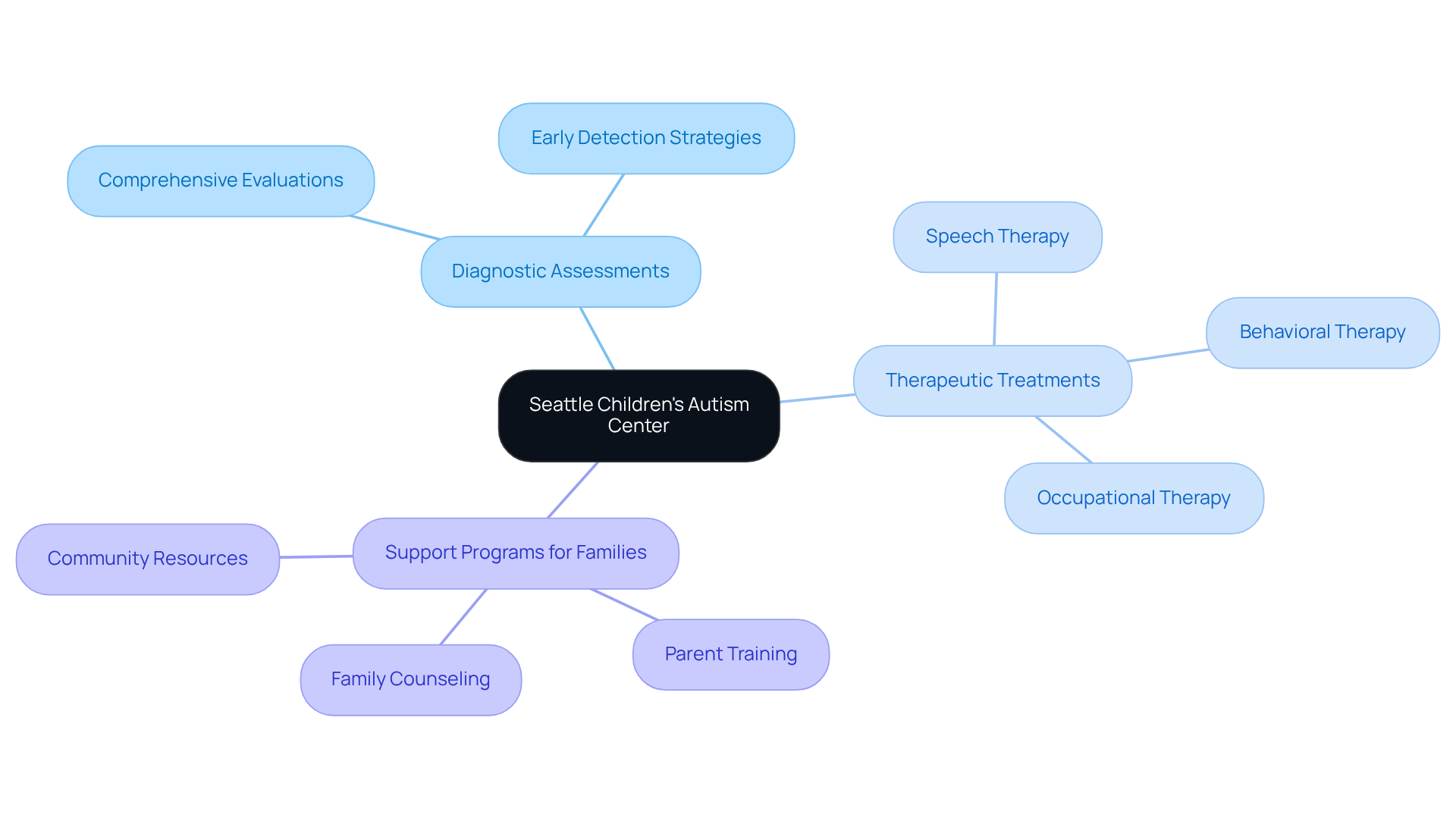
NIMH: Research and Information on Autism Spectrum Disorders
The National Institute of Mental Health (NIMH) acts as an important autism resource center for parents looking to understand spectrum disorders. With a wealth of scientific research, treatment recommendations, and educational materials, NIMH aims to enhance awareness and understanding of these conditions. Recent research from NIMH reveals important trends in the treatment of developmental disorders, underscoring the significance of evidence-based practices. Did you know that developmental disorders affect approximately 1 in 36 children in the U.S.? This statistic highlights the crucial nature of NIMH's findings for parents who are searching for effective treatment options. By engaging with NIMH's research, parents can stay updated on the latest advancements in care for their children, ensuring they have access to strategies that cater to their child's unique needs. To explore these invaluable resources, parents are encouraged to visit the autism resource center, where they will find an abundance of information and tools to support them on their journey.
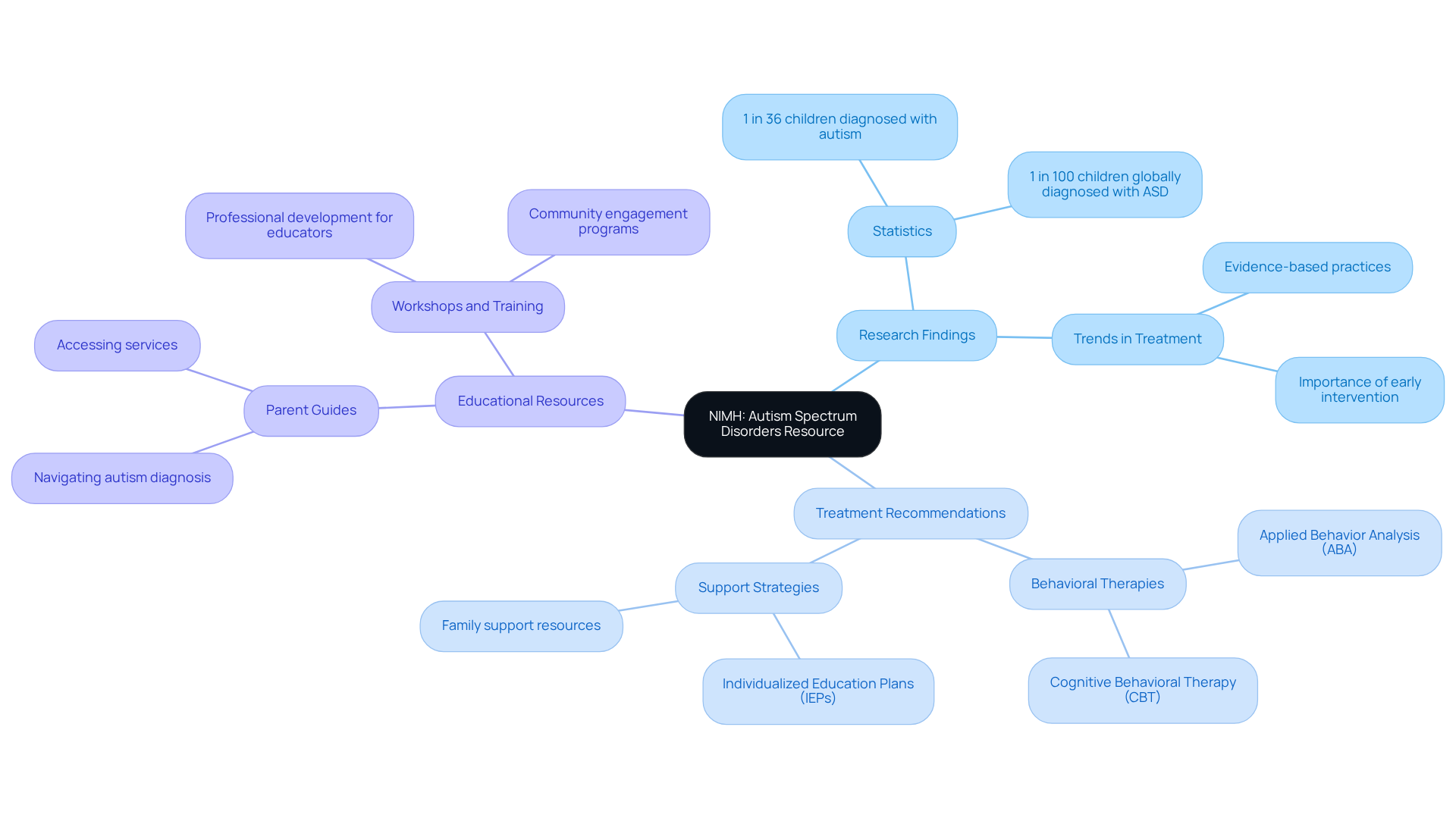
British Columbia Autism Resources: Funding and Support Information
In British Columbia, families have access to a rich array of support options, including funding programs tailored to help them secure essential services. These initiatives offer financial assistance for therapies, educational materials, and interventions that foster skill development in young individuals with developmental disorders. Understanding the available funding options is crucial for parents, as it empowers them to navigate the financial aspects of care effectively.
Recent data indicates that households utilizing financial support for therapies related to developmental disorders experience greater access to vital services, leading to improved developmental outcomes for their children. In fact, a recent study found that 75% of families reported enhanced service access after receiving financial aid. By tapping into these resources, parents can not only enhance their children's development but also manage the challenges of support more adeptly.
As advocate Dr. Stephen Shore wisely notes, 'If you’ve met one person with this condition, you’ve met one person with this condition,' underscoring the unique needs that these funding programs strive to address.
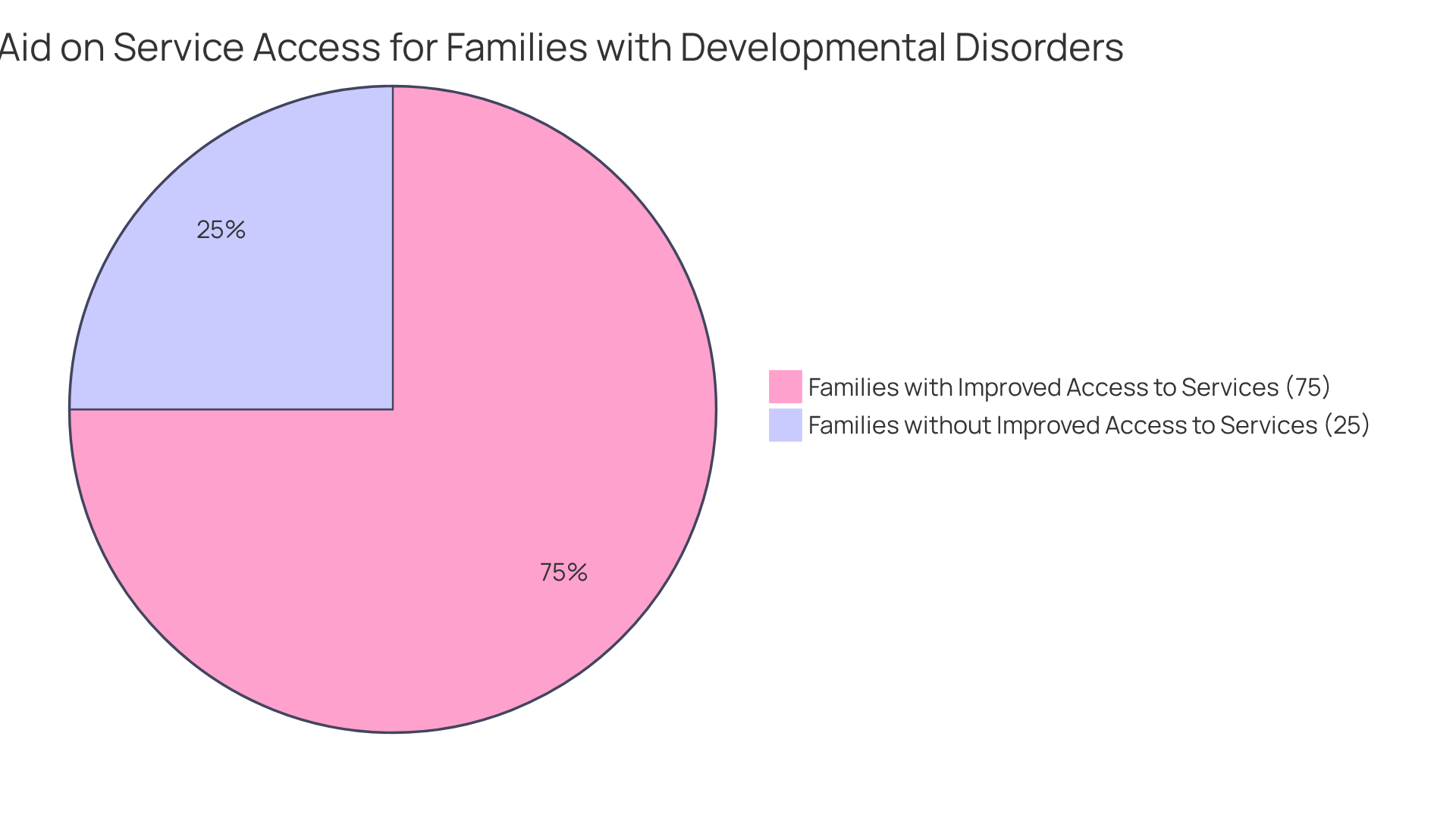
American Psychiatric Association: Insights on Diagnosis and Treatment
The American Psychiatric Association (APA) plays a vital role in shaping the landscape of autism spectrum disorder (ASD) diagnosis and treatment. The autism resource center provides extensive resources, including clinical guidelines, educational materials, and advocacy tools designed to enhance understanding and management of autism. By leveraging these resources, parents and professionals can align their practices with the latest evidence-based methods, ensuring optimal care for autistic individuals.
Early diagnosis is crucial; it can significantly enhance a young person's functioning by providing prompt access to supportive community services. As Dr. Amalia Londoño Tobón notes, 'An early diagnosis can significantly enhance a young person's functioning by offering the family prompt access to an autism resource center and other supportive resources in the community.' This highlights the importance of acting swiftly and seeking support.
Moreover, the APA's commitment to mental health equity and diversity underscores the need for customized interventions that cater to the unique requirements of every individual on the spectrum. With the rise in diagnoses of developmental disorders—now estimated at 1 in 31 children, with about 4 in 100 boys and 1 in 100 girls affected—staying informed through the APA's educational materials becomes essential for effective advocacy and support.
Lastly, the APA offers tools to combat stigma and discrimination in mental health, further emphasizing the necessity for comprehensive care. Together, we can foster an environment of understanding and support for those affected by ASD.
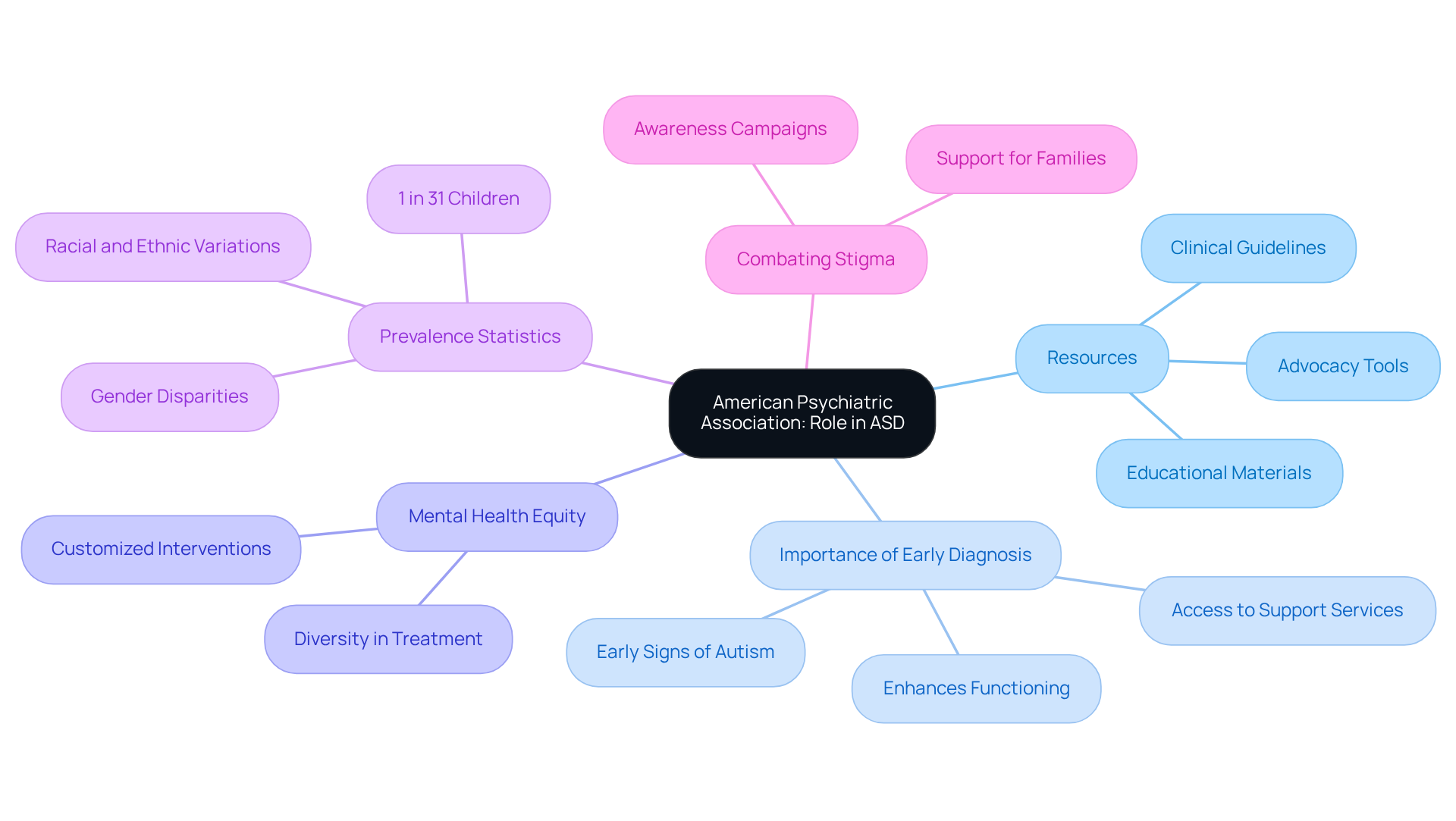
OCALI: Resource Gallery of Autism Interventions
OCALI provides a nurturing collection of materials through the autism resource center, dedicated to interventions for individuals with autism spectrum condition, specifically designed to support learners with this unique experience. This collection features evidence-based strategies, adaptable templates, and practical tools tailored to individual needs, recognizing that each journey with the condition is distinct. By leveraging the autism resource center and OCALI's resources, parents and professionals can implement strategies that foster positive outcomes for children on the autism spectrum, enhancing their educational experiences and overall development.
As part of a broader community initiative, these materials promote collaboration and support among parents and professionals. With over 10,000 entries documented in recent years, the gallery continues to expand in both relevance and utility. Moreover, subscribing to the newsletter provides families with updates and unrestricted access to these vital resources, empowering them to navigate this journey together.
How has your experience been? We encourage you to share your thoughts and stories, as every voice contributes to this supportive community.
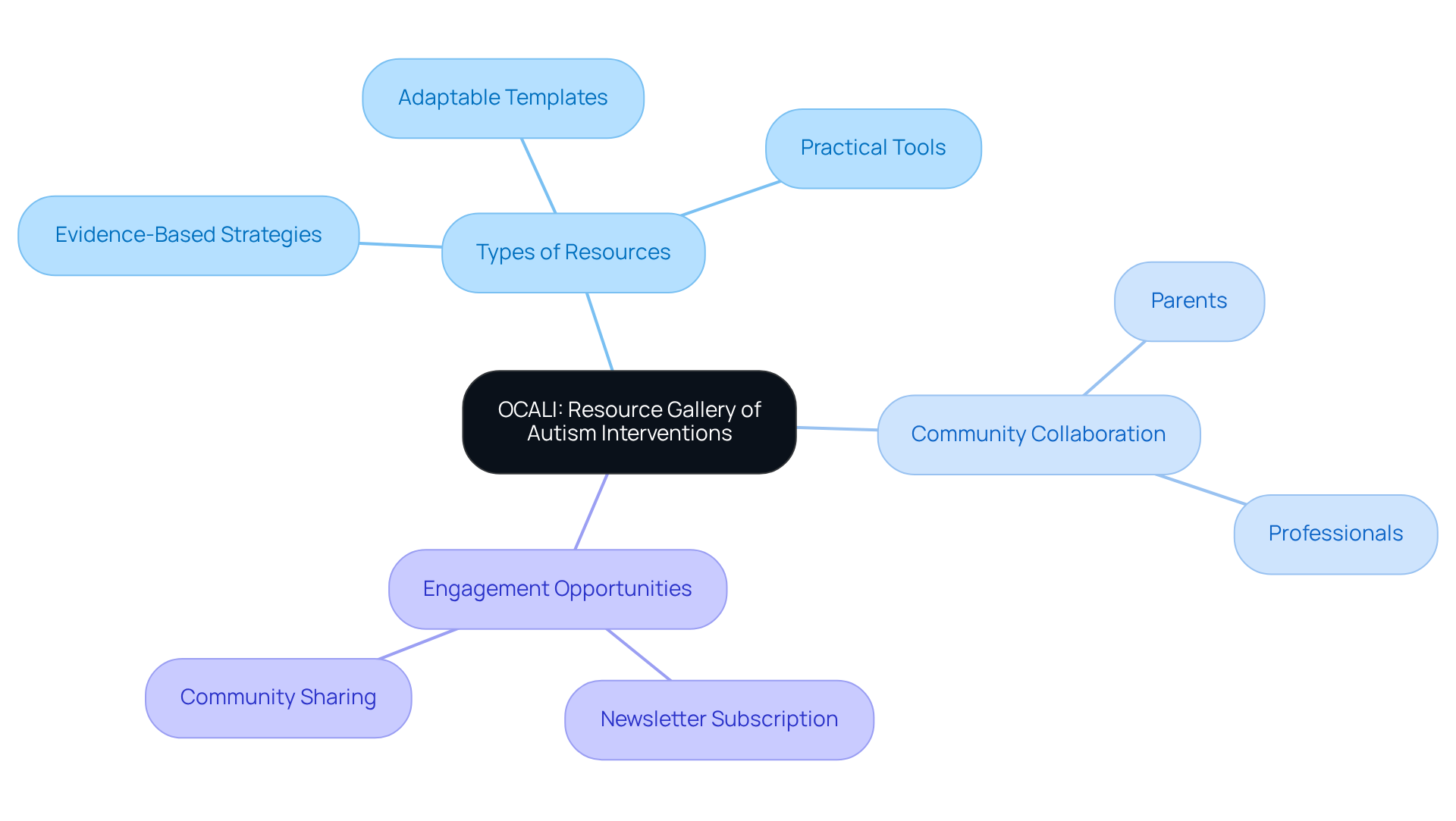
Autism Society of America: Advocacy and Resources for Families
The Autism Society of America plays a vital role in advocating for individuals with developmental disorders and their families. They provide a wide array of tools designed to empower and assist those in need. Their initiatives encompass educational materials, advocacy tools, and access to support networks that foster community engagement. By connecting with the autism resource center, parents can access essential information and resources that significantly improve their understanding and management of autism-related challenges.
This advocacy not only equips families with necessary tools but also nurtures a supportive community dedicated to improving the quality of life for those affected by autism. Consider this: nearly 25% of school-age autistic individuals are thriving in all developmental domains by age 10. This statistic highlights the positive impact of effective support systems. Additionally, with 80.2% of mothers of autistic children reporting anxiety symptoms, the importance of the autism resource center's resources becomes even clearer.
Their unwavering commitment to advocacy is crucial in addressing the disparities in autism prevalence and diagnosis. It ensures that families receive the necessary services and interventions to thrive. Together, we can work towards a brighter future for individuals with autism and their families.
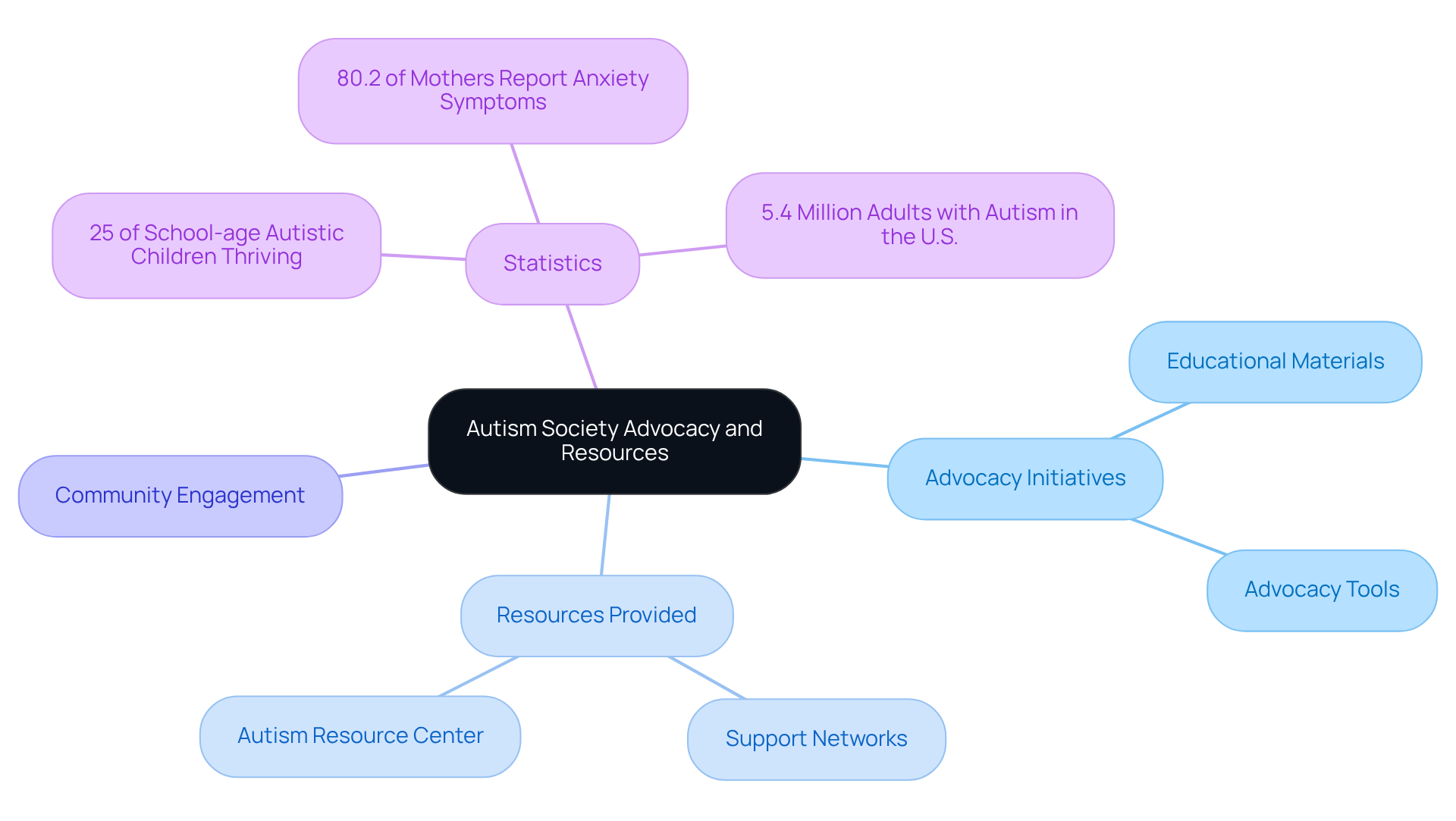
Conclusion
Navigating the complexities of autism spectrum disorder (ASD) can feel overwhelming for parents. However, the existence of dedicated autism resource centers provides essential support and guidance. These centers are more than just places to find information; they are vital lifelines that empower families with the tools, resources, and community connections needed to foster positive outcomes for their children.
In this article, we have explored key insights into various autism resource centers, showcasing their unique services and contributions. From early intervention programs at ASD Media to the specialized care offered at the Lurie Center for Autism, each center plays a crucial role in enhancing the lives of individuals with autism. The significance of training and effective management resources, as highlighted by Milestones Autism Resources, underscores the importance of well-equipped caregivers. Local hubs like the New Brunswick Autism Resource Hub and the Seattle Children's Autism Center also provide tailored support, addressing the specific needs of families within their communities.
As we witness a rise in the prevalence of developmental disorders, the importance of these resource centers becomes even more apparent. Parents are encouraged to actively seek out these invaluable services and engage with the supportive networks available to them. By doing so, they can ensure that their children receive the comprehensive care and advocacy essential for thriving. Together, we can cultivate an environment of understanding and support that empowers every individual on the autism spectrum to realize their full potential.
Frequently Asked Questions
What is the mission of ASD Media?
ASD Media is committed to enhancing the application of ABA therapy by providing a comprehensive range of tools and insights for parents and professionals, fostering a nurturing community for sharing experiences and learning.
How does ASD Media support families dealing with autism?
Families can subscribe to ASD Media's newsletter to stay informed about the latest news and access valuable resources from the autism resource center, aimed at improving outcomes for children with autism and ADHD.
What does research say about the effectiveness of ABA therapy?
Research indicates that early intervention through ABA therapy can lead to significant advancements in communication and social skills, with 50% of young individuals showing improvements when therapy begins before age four, and 90% of children receiving intensive therapy experiencing substantial progress.
What role does the Lurie Center for Autism play in supporting families?
The Lurie Center for Autism offers specialized services including comprehensive diagnostic assessments, evidence-based therapeutic interventions, and strong family support programs, tailored to meet the unique needs of individuals with autism.
What is the significance of early diagnosis in autism?
Early diagnosis and timely access to services are crucial, as the average age of diagnosis for autism in the U.S. is five years. Early intervention can lead to better outcomes for children.
How do training programs contribute to managing autism effectively?
Training programs provide families and professionals with essential resources, such as evidence-based methods and coaching, resulting in a 63% increase in positive outcomes for autistic individuals.
What is the importance of understanding and support for individuals on the autism spectrum?
Understanding and support are vital in recognizing the unique strengths of each individual on the spectrum, as emphasized by Temple Grandin's statement, "I am different, not less."




